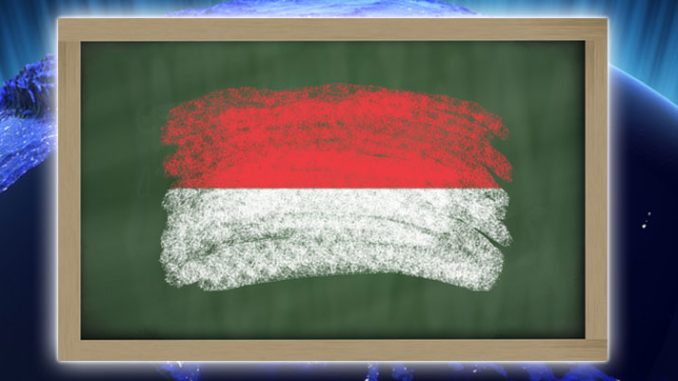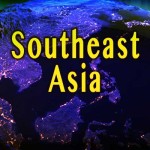
Thank you, Mr. Chairman. As you know, we are having parliamentary elections in Indonesia on the 5th of April, and this should actually be a very good time to talk about leadership in Indonesia. The problem is, I’ve been looking at the advertisements and campaigns of this election campaign period, looking at all the clowns in the advertisements and all the funny things going on in the campaigning, and it’s very hard for me to think seriously about leadership in Indonesia.
And therefore I was half-jokingly thinking about a title for this talk: neither statesmen nor managers – the not-so-strange case of Indonesia’s missing leaders. So rather than simply talking about what sort of leaders we have or don’t have in Indonesia, I want to talk – first of all – about one of my pet peeves. Right now one pet peeve comes from the ads I see on Indonesian television. (I live in Singapore but I do catch Indonesian TV because my wife likes the Dangdut on Indonesian TV). It is this nostalgia for the New Order which is pervasive. There are actually parties unashamedly and unabashedly coming out with advertisements saying: “How great life was under Suharto,” “How wonderful the Golden Age of Suharto was and let’s go back to that.” And this strikes a chord with some people, I must say with great trepidation and a great degree of shame.
The idea is that Indonesia is in a state of chaos and therefore we need a strong leader like Suharto to put things right again. Without Suharto the economy will never go up and Indonesia will break apart. So if possible, let’s have some generals in there again. Hence the popularity of people like Susilo Bambang Yudhoyono, and this fellow Wiranto who should be in jail but is now running for president, not to mention Prabowo Subianto, the son-in-law of Suharto.
Basically, the ideas that have come up are the sort of ideas Pasuk was talking about when quoting Thaksin and his followers – that maybe democracy is bad and authoritarianism is what we need. It’s superior to democracy. And if anything, the failure of leadership in Indonesia since 1998 has shown that authoritarianism is superior to democracy.
Now obviously, this involves a selective process of remembering the New Order. People really have short memories – this was only six years ago and people have already developed the capacity to remember the New Order as a Golden Age of prosperity and tranquility for all. It was safe to walk the streets and so on. And in the same process, they forget that this world involved the entrenchment of a rabidly corrupt social and political order backed by a particularly ruthless form of state terrorism. Equally important, people conveniently forget that all the problems Indonesia has right now are due to that strong leadership.
The economic crisis and the political malaise we have in Indonesia today were not caused by democracy or the period after 1998. They are a legacy of Suharto, what we inherited from Suharto. So why is he supposed to make things right again? Actually, I have no idea. This is a fellow who left us with 140 billion dollars in combined private and public debt. This is a fellow who was responsible for engineering Indonesia’s decrepit banking sector, which became a milking cow for the rich and the well-connected and the greedy during the last years of his rule, and which certainly contributed to the particularly serious manifestation of the Asian crisis in Indonesia.
Moreover, Suharto’s “strong leadership” is responsible for the dearth of leadership talent in Indonesia today. His authoritarian and heavily centralized regime ensured that anybody with any talent for leadership would somehow be removed because they could potentially emerge as a threat. So over the thirty years or so that he was in power, anybody that was half-way smart would be gone.
What emerged from the debris of the New Order after it crashed in 1998 were the old regime’s petty apparatchiks, operators, fixers, adventurers, henchmen, and hangers-on moving into the major political positions nationally and locally, in the parties and in the parliaments, in the executive bodies and in the legislative bodies. The organizations from which the New Order recruited its apparatchiks, operators, enforcers, killers, and murderers – the mass associations, political parties, and so on – were basically not the kind of place from which you would expect talented leadership to emerge. In fact, these were the kind of places where the most mediocre were ensured, even guaranteed to rise within the conduits of power in the New Order. The more mediocre you were, the greater chance you had of making it in the New Order.
Why be surprised, then, at the kind of people who inhabited the lower levels of the New Order system of patronage? We are talking about a system of patronage which extended from Cendana Palace, where Suharto lived, all the way down to the local level. And at the end of the New Order, these are the people who have gone up a notch or two. These are the people who have become the main beneficiaries of reformasi.
What sorts of people are in the political parties and the parliaments now? I’ve been doing research at the local level and when I interview politicians, I ask them: “What were you doing five years ago?” They answer: “I was doing errands for the general who was governor at that time.” I add: “What are you doing now?” And they reply: “I’m head of parliament.” These are the sort of people who are running the show – mediocre, petty apparatchiks, fixers, and adventurers.
I’ll refer to what Paul was saying about parties in the Philippines – that they are weak and they do not really have an agenda – and that reminds me very much of Indonesia’s political parties. Except that I don’t think they are weak – they’re actually strong and powerful, and they don’t really need an agenda to be powerful. All they need is money politics, systems of patronage, and an apparatus of political violence. They do not need an agenda! What’s the point of having one? It’s difficult to draw one – you have to pay all those consultants.
So my suggestion is that in the case of Indonesia – and I would suspect the Philippines and Thailand as well (but I am not the expert) – it is not in the interest of the parties to conform to that ideal type of political party Paul was talking about – the aggregating and whatever, things that we learn in Political Science 101. It’s not in their interest! Their interest is to have vehicles through which they can continue the New Order tradition of accumulating private capital on the basis of predatory control of public resources – in other words, robbing the people blind. And political parties are now the main vehicles through which you can do that.
There is an important difference, though, in that the game must be played differently. In an authoritarian regime, all of this robbing the people blind was protected by a heavily centralized regime with very, very scary soldiers and so on. Today we still have lots of scary soldiers, but these lower apparatchiks and others who have recently come up are realizing (as they are realizing in Thailand and the Philippines): “Hey, you know what – we do not need authoritarianism. Democracy is quite nice after all. A certain type of democracy is alright as long as we have these types of political parties, as long as we can always rob and find the money to continue the money politics and so on, as long as we have henchmen and enforcers, who do not have to be military people anymore, we can still be in power!” This is the great realization that they’ve had in the last five years – “we do not need authoritarianism.” In fact, I think a lot of them would be very scared of the military coming in again, because that would mean the end of the party for them. They would have to share and negotiate with the military again, and a lot of them would not like that.
Somebody will say: “What about all those wise technocrats that the New Order had? The economists from the Universiti Indonesia who studied in Berkeley and all those fine institutions in America, and who – according to World Bank reports until 1997 – were supposed to have driven Indonesia towards a rational, market-based economy and all that stuff?” If you look at the history of the New Order, you see that these people were never really influential unless Suharto wanted them to be, i.e., when it was expedient for him to make them influential. When there was the oil boom, however, he would say: “Widyoyo go away! I want to talk to Lim Siew Leong now.”
Basically their function was to provide a façade of rationality to a regime which was at its core predatory, rapacious, and ruthless. It was a good image to project vis-à-vis the world community, the World Bank, etc. – that we had all these people who spoke English and Dutch and were versed in neo-classical economy theory and could memorize Milton Friedman. But in reality, these people were never particularly the ones making the decisions in Indonesia.
So what are we left with? We are left with a generation of leaders who are very insular in their experience of the world. Leaders who are very, very impoverished in their views. They have no experience whatsoever with real popular politics except, from time to time, when they need to mobilize people in electoral campaigns. They are very good at that – hire a few dangdut singers and people will come. But in terms of really being engaged in popular politics, these people have no experience whatsoever. What they have experience with is political intrigue. Insofar as these people have talent at all, it is a talent for backroom wheeling and dealing. It was backroom wheeling and dealing that got Gus Dur elected; it was backroom wheeling and dealing that got him impeached. It was backroom wheeling and dealing that got Megawati elected. This is the sort of thing these people are good at.
Perhaps I should say that there are two kinds of people in Indonesia today. The first category of people are those who are positively nostalgic about the New Order and look at it as some kind of Golden Age. The second category of people are those who blame it for just about everything that is wrong with Indonesia. I firmly and unabashedly put myself in the latter category. Having said that, the question arises: where will new leadership come from? Where will it come from if all the people were nurtured and incubated under an authoritarian system with a socialization process which has made them mediocre?
That is a very difficult question to answer. But of course it is the main question in terms of leaders. Will they come from the student groups? Will they come from the youth? Will they come from the NGOs? Will they come from the military? Will they come from business, local, or religious groups? There are reformers in almost all of these categories I mentioned – except for the military. But my experience over the last 4 to 5 years is that even the reformers have been sucked into the logic of the system as it exists now. So they have had two choices: either play the game of money politics, and many of my old activist friends have done this – they’ve joined the parties, made a lot of money, and now drive BMWs. Or they could leave, and some of them have done this. Insofar as we might expect new kinds of leadership to emerge from some of these social categories, I think we should probably temper those expectations with the realization that reformers who emerged in the last 4 to 5 years have either been sucked into the system of money politics or have been removed.
Having said that, however, there is – I think – one possible source of optimism, and it is this: It is no longer possible to behave and to be socialized in exactly the same way as during the New Order. The context in which a new generation of activists or thinkers or intellectuals might emerge in 10 or 15 or 20 years, will be different. So I am saying that we should forget about this generation. We will have to wait a bit longer and hope that in the process of flux that Indonesia is in the midst of now, new kinds of experiences and new forms of socialization will enable leaders of a new type to emerge. Not today, I am sorry. I am afraid we will just have to be patient.
Getting back to the issue of the strong leader that was raised in the beginning of this symposium: I was sifting through some Indonesian newspapers recently and read an article by a Jakarta business consultant who wrote that the elections were a way of separating mediocre from strong leaders who had vision. Obviously he still has some hope for this generation; he still thinks there are leaders that all Indonesians can follow unwaveringly and without hesitation. Of course this reflects the predicament in which business finds itself – the lack of predictability. During the Suharto period, if you were a businessman who wanted to invest in something, you knew who to bribe. Now when I talk to business people working in Indonesia, they say: “Our biggest problem is that we don’t know who to bribe. We’re never sure if we’re bribing the right person.”
So what this fellow wants is predictability. It was certainly not a call for a return to authoritarianism – it was far from that. However, it was certainly saying: “Let’s have a strong leader who we can trust to put things into shape.” Now I have lived with an Indonesia which had a strong leader for more than three decades, and I do not like the result. If there is one thing I do not want for Indonesia it is a strong leader. And although I’ve written very critically about it, I think that some of the unpredictability and dynamics of Indonesian politics right now might actually provide opportunities that would not have existed in the ultra-paranoid, ultra-repressive, and highly-regulated authoritarian regime of the New Order. It was just too stifling for real leaders to emerge.
So I do not want a strong leader, and I think the real lesson from Indonesia for the rest of the region – and I say this to some of my Thai colleagues who have been inundated by this idea of Thaksin as strong leader, or Filipino friends who question Arroyo and demand that they need this sort of thing – is not to wish too hard for the emergence of a strong leader. You might just get what you ask for. Thank you very much.
Giles Ji Ungpakorn: I think that we need to add one note of caution to this very depressing analysis. It is that before the fall of Suharto, not one academic book or article in Indonesia predicted that Suharto would be overthrown, nor did they try to consider who would take over afterwards…
Our final speaker today shouldn’t need any introduction. Professor Benedict Anderson has written many, many works on Southeast Asia. He is an expert on Thailand and Indonesia among many other things, and he’s had the honor of being banned from Indonesia at certain points in time. So without any further ado, I’d like to invite Professor Anderson to give his talk.
 Pasuk Pongphaichit on Thailand
Pasuk Pongphaichit on Thailand
 Francis Loh Kok Wah on Malaysia
Francis Loh Kok Wah on Malaysia
 Paul Hutchcroft on The Philippines
Paul Hutchcroft on The Philippines
 Benedict Anderson on Southeast Asia
Benedict Anderson on Southeast Asia
Kyoto Review of Southeast Asia. Issue 6 (March 2005). Elections and Statesmen


